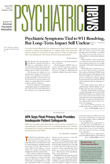Psychiatrists who are experts in the field of psychosomatic medicine may soon be eligible for subspecialty certification in that area.
Psychosomatic medicine, along with the neurology subspecialty of vascular neurology, has fulfilled criteria that the American Board of Psychiatry and Neurology (ABPN) requires for a discipline to be eligible for subspecialty-certification status.
With approval by the ABPN board, the proposal to add certification for the two new areas will next go to the American Board of Medical Specialties (ABMS). If the ABMS endorses the psychosomatic medicine subspecialty, sometimes called consultation-liaison psychiatry, it will then be forwarded to the Residency Review Committee in Psychiatry (RRC). Upon approval of its subcommittee that deals with certification and subcertification issues, the RRC will begin to develop the requirements that psychiatrists completing postgraduate training in psychosomatic medicine will have to meet.
The RRC then circulates those training requirements to experts in the field, and final approval hinges on endorsement by the Accreditation Council on Graduate Medical Education.
An application for recognition as a subspecialty must demonstrate to the ABPN that several criteria are met. These are, according to the winter 2002 issue of ABPN Update, that “a significant number of physicians are practicing the subspecialty, that this number has increased continually over the last decade, that there is at least one national society for the subspecialty, and that the training sequence and program essentials for the subspecialty are specified.”
The psychosomatic medicine application was submitted by the Academy of Psychosomatic Medicine (APM) and the Association for Medicine and Psychiatry. An APM survey indicated that about 1,000 APA members devote at least 50 percent of their practice to psychosomatic medicine, and an additional 1,500 spend between 25 percent and 50 percent of their professional time seeing to the psychiatric care of patients with complex medical and surgical conditions.
As with the other approved psychiatric subspecialty areas, psychiatrists who want certification and are experienced in psychosomatic medicine will be grandfathered in terms of meeting education requirements for the first five years after the subspecialty wins approval. They will still have to take and pass the certification exam.
The six fields in which subspecialty certification is already available to psychiatrists are child and adolescent psychiatry, geriatric psychiatry, clinical neurophysiology, addiction psychiatry, forensic psychiatry, and pain management. ▪
